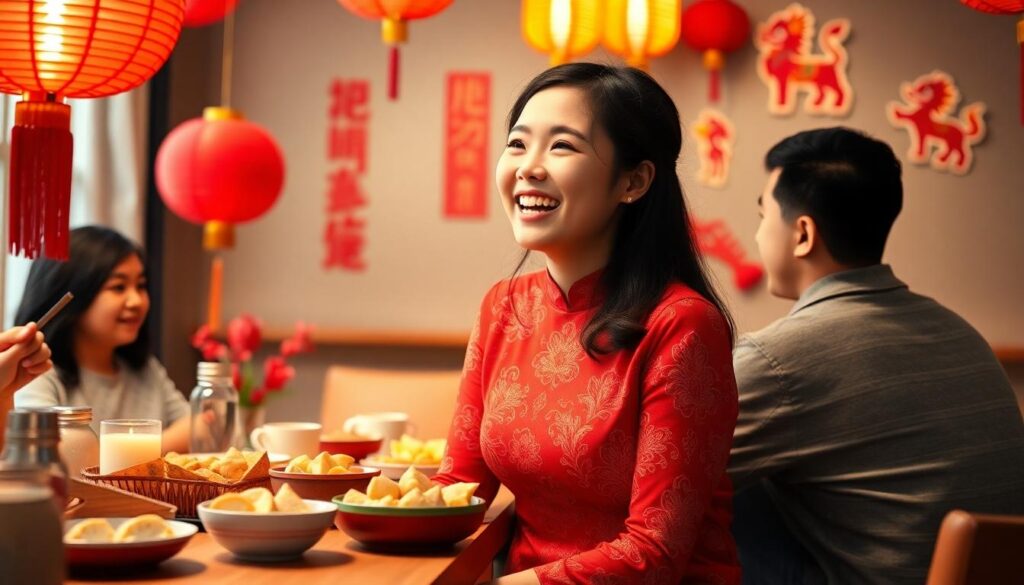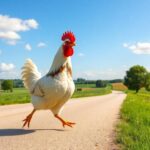Laughter and celebration go hand-in-hand during Chinese New Year, one of the most vibrant festivals in Asian culture. We’ve gathered the funniest Chinese New Year jokes that’ll have you roaring louder than a lion dance performance! Whether you’re hosting a family gathering or simply want to spread some cultural cheer, these jokes are perfect for bringing smiles to faces during this auspicious time.
Looking to add some humor to your Chinese New Year celebrations? You’re in the right place! We’ll share jokes about everything from the zodiac animals to red envelopes and festive traditions. These witty one-liners and puns aren’t just entertaining—they’re also a fantastic way to teach children about this important cultural holiday while keeping the atmosphere light and joyful.
10 Hilarious Chinese New Year Jokes to Share at Family Gatherings
- Why don’t Chinese New Year dragons ever get lost? Because they’re always following the guy with the map! Family gatherings become instantly more cheerful when you break the ice with this classic dragon parade joke.
- What did the rabbit say to everyone when it became the zodiac animal of the year? “Hop to it and have a lucky year!” This joke works perfectly during the Year of the Rabbit and always gets a chuckle from younger relatives.
- How does the Jade Emperor organize the zodiac race? Very care-philly! The pun on “carefully” relates to the mythological story behind the Chinese zodiac and makes for a great conversation starter about the zodiac origin story.
- What’s a lion dancer’s favorite snack? Fortune cookies with extra crunch! While not traditionally Chinese, this joke bridges eastern and western cultural elements for a universally understood punchline.
- Why was the ox so good at saving money during Chinese New Year? Because he was very bull-getwise! This wordplay on “budget-wise” especially resonates during Ox years and when discussing the tradition of giving hong bao.
- What did one firecracker say to the other? “My pop is bigger than your pop!” Kids absolutely love this simple joke that captures the exciting sound of New Year celebrations.
- Why couldn’t the tiger get a loan during Chinese New Year? Because his credit was spotty! This joke works wonderfully when discussing financial prosperity wishes common during the festival.
- How do you know if a Chinese restaurant is closed for New Year celebrations? There’s a “wok out” sign on the door! This play on “walk out” never fails to get eye-rolls and laughs from family members.
- What happened when the monkey tried to write Chinese New Year couplets? He made a calligra-mess! This pun highlights the beautiful tradition of hanging red scrolls with calligraphy while keeping things lighthearted.
- Why do Chinese families clean their houses before New Year? To sweep away bad luck, but mostly to hide the evidence before relatives arrive! This relatable joke acknowledges both the traditional meaning and practical reality of pre-festival cleaning that resonates with anyone who’s frantically tidied before hosting.
Why Chinese New Year Humor Brings Good Fortune

Laughter during Chinese New Year isn’t just entertaining—it’s considered auspiciously powerful. The tradition of sharing jokes and humorous stories during this important holiday carries deeper cultural significance that extends beyond mere entertainment.
The Cultural Significance of Laughter During Festivities
Chinese New Year humor beautifully reflects traditional Confucian values of harmony and respect. Jokes often incorporate symbolic elements like dragons representing power, dumplings symbolizing wealth, and firecrackers warding off negative energy. These playful references to “dragons as fire-balls of fun” or dumplings “reaching the top of the New Year” aren’t random—they reinforce cultural symbols intrinsically linked to prosperity and good fortune. The humor during festivities subtly maintains social cohesion while allowing for gentle teasing that doesn’t cross into disrespect.
Taoist influences appear prominently in lighthearted takes on balance, such as jokes about noodles “stirring excitement” or lanterns sharing warmth. Throughout history, festival humor has served as a clever vehicle for addressing societal norms without direct confrontation, softening taboos through laughter rather than confrontation. This positive atmosphere is believed to attract luck and prosperity for the coming year, making humor an essential element of the celebration.
How Jokes Strengthen Family Bonds
Shared laughter during family reunions creates powerful intergenerational connections. Quick, relatable jokes featuring pandas dancing or goldfish wearing party hats appeal to family members of all ages, effectively bridging gaps between tradition-focused elders and younger generations. This inclusive humor ensures everyone feels part of the celebration regardless of age or background.
Comedic storytelling about red envelopes or family gatherings has become especially important in diaspora communities, helping preserve cultural identity while fostering collective joy. Humor serves as an effective tension diffuser during high-stakes traditional activities, ensuring family interactions remain warm and welcoming. The jokes shared during Chinese New Year don’t just entertain—they strengthen the familial fabric that makes these celebrations so meaningful and enduring across generations.
Punny Zodiac Animal Jokes That Will Make Everyone Roar
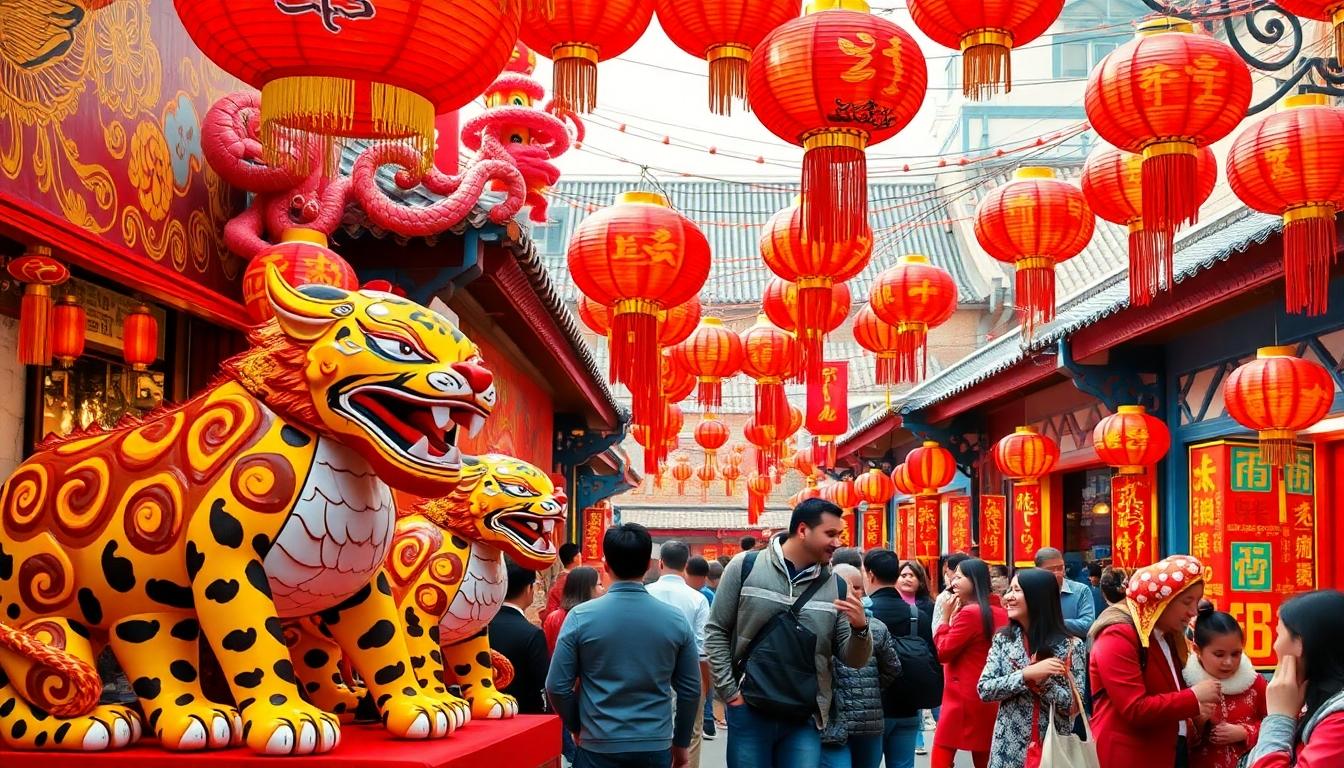
Chinese New Year celebrations become even more enjoyable with animal-themed jokes that play on the traits of the zodiac creatures. We’ve gathered some hilarious puns that feature the beloved animals of the Chinese zodiac.
- Dog Jokes: Why did the dog celebrate Chinese New Year? By whining and dining!
- Goat Jokes: What do goats say on Chinese New Year? Gong Xi Baa Cai!
- Tiger Jokes: Did you hear about the tiger that stole a calendar on Chinese New Year? He got 12 months!
Tiger Tales That Are Grrr-eat
Tigers hold a special place in Chinese zodiac folklore, known for their courage and power. Their playful side comes alive in these tiger-themed jokes that will surely make everyone smile.
- Tiger Greeting: What do tigers say to their elders before receiving a red packet? Happy Mew Year!
- Tiger Humor: Tigers often feature in Chinese New Year jokes because of their bold and striking nature, making them perfect subjects for playful puns.
Dragon Jokes That Breathe Fire Into Conversations
Dragons symbolize good fortune and strength in Chinese culture. These mystical creatures inspire some of the most entertaining zodiac jokes for your New Year celebrations.
- Dragon Snack: What do dragons eat at Chinese New Year? Firecrackers!
- Long Year Jokes: Which zodiac animal’s year occupies the most time? The dragon’s. Because it is a “LONG” year!
Fortune Cookie Humor: Predictions That Will Crack You Up
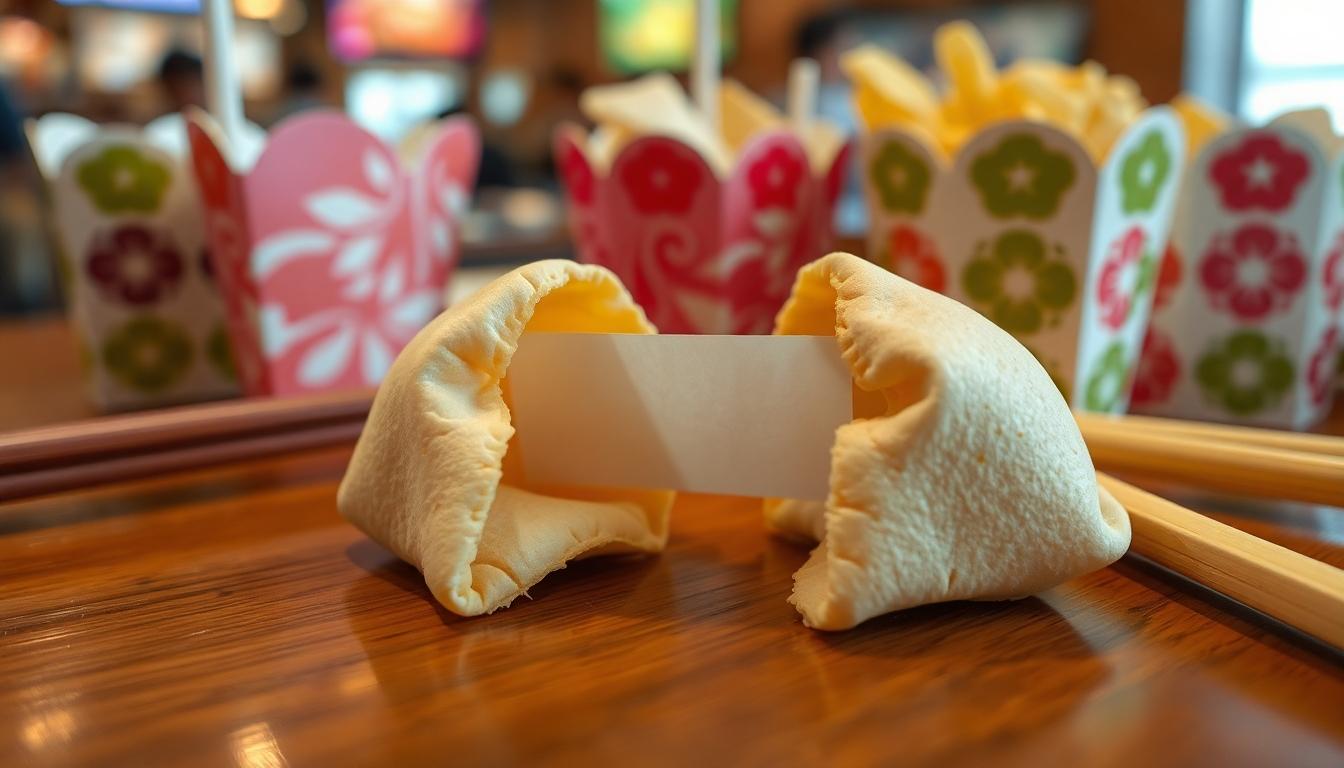
Fortune cookies have become an iconic part of Chinese restaurant experiences, offering not just a sweet treat but also a glimpse into potential futures—sometimes with hilariously unexpected results. These tiny prophets have evolved from simple predictions to vessels of wit and humor that leave diners laughing.
When Cookie Fortunes Go Hilariously Wrong
Fortune cookies don’t always deliver profound wisdom—sometimes they serve up unintentional comedy gold instead. Many people have cracked open cookies to find absurdly blunt messages like “Don’t expect much from a cookie,” which perfectly captures the self-aware irony that makes modern fortunes so entertaining. Empty fortunes occasionally make their way into cookies, creating the ultimate anticlimax after the satisfying crunch. One particularly memorable fortune advised, “Go ahead and get the complete stormtrooper costume,” demonstrating the delightful randomness that can occur when fortune writing goes off script. These mishaps often become more memorable than traditional good-luck messages, with diners frequently sharing their bizarre fortunes on social platforms under titles like “My Ironic Fortune Cookie.” The disconnect between the ceremonial breaking of the cookie and receiving advice that subverts expectations creates a perfect comedy moment that enhances the dining experience beyond mere prediction.
Red Envelope Jokes to Share While Giving Hongbao
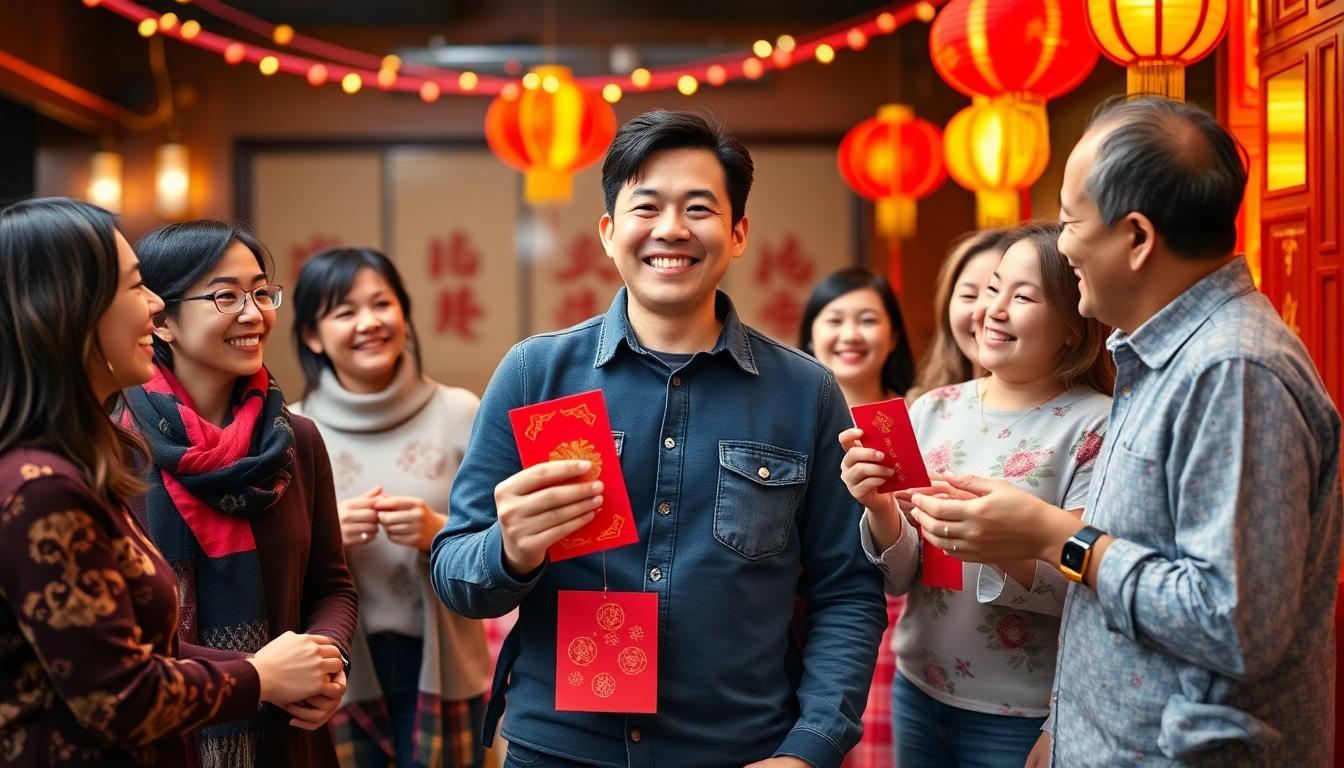
Hongbao (red envelopes) are a highlight of Chinese New Year celebrations, filled with money and good wishes. Adding some humor while exchanging these lucky packets can make the tradition even more memorable and fun for everyone involved.
Money Puns That Make Cents
Sharing these cash-themed jokes will definitely enrich your hongbao-giving experience:
- Cash Cow Commentary: “Why did everyone bring money to the New Year’s party? It was a cash cow event!” This joke perfectly captures the abundance of red envelopes during festivities.
- Pocket Change Humor: “What do you call money that’s always changing? A dime-namic personality!” Slip this joke in while handing a red envelope to younger family members.
- Fortune Forecasting: “Why did the money go to the party? It wanted to make some cents and have a blast!” This playful pun emphasizes both the financial and fun aspects of hongbao.
- Envelope Enthusiasm: “What did the red envelope say to the money? You’re a real cash cow this year!” Personifying the hongbao adds an extra layer of charm to the gift-giving process.
- Bovine Blessings: “What do cows say before receiving a red packet? Happy Moo Year!” Animal-themed money jokes connect the zodiac tradition with the gift of hongbao.
- Equine Excitement: “What do horses say when getting hongbao? Happy Neigh Year!” This continues the animal theme with an equine twist that children especially enjoy.
- Currency Conversation: “Why does money never sleep during Chinese New Year? It’s too busy changing hands!” This joke highlights the lively exchange of red envelopes during celebrations.
- Wealth Wishes: “I’d tell you a joke about being rich after receiving hongbao, but I don’t want to change the subject!” This clever wordplay works perfectly while exchanging red envelopes.
Festive Food Puns That Dish Out the Laughs
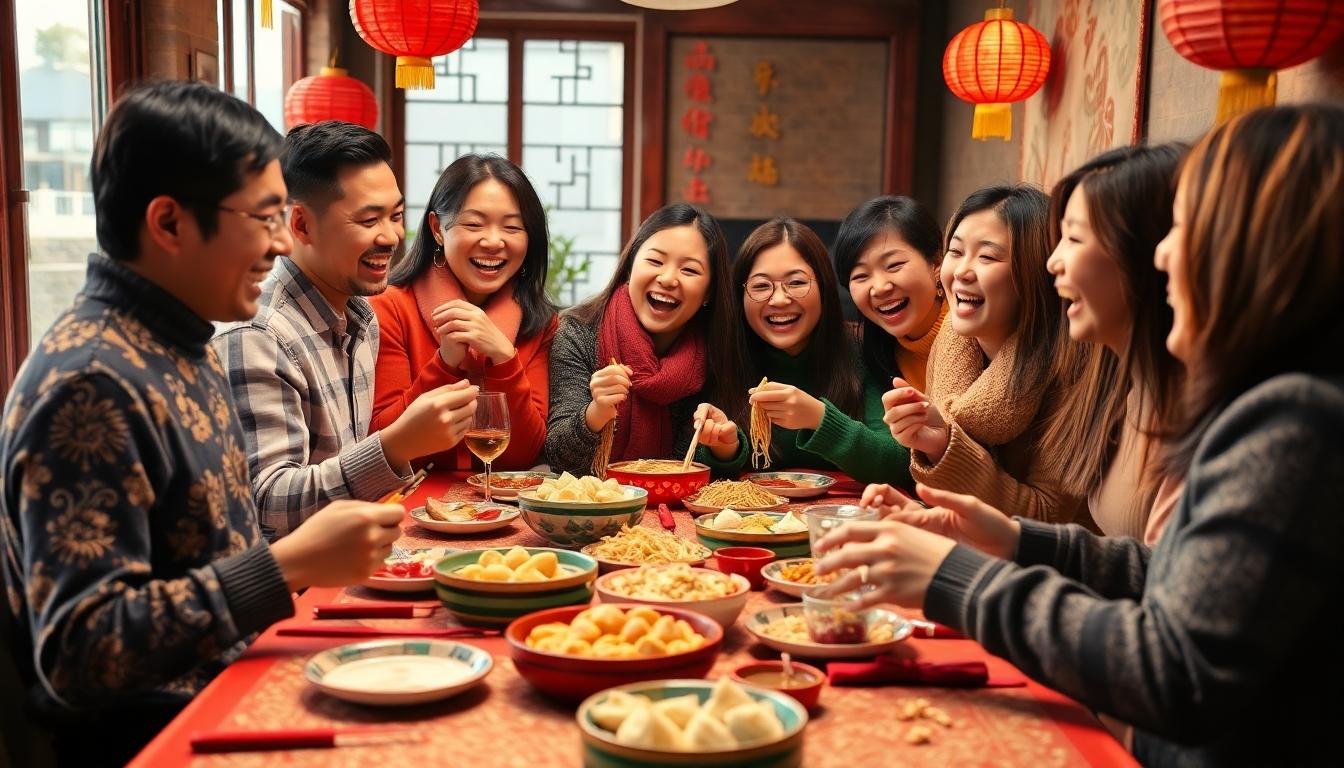
No Chinese New Year celebration is complete without traditional festive foods, which also serve as perfect ingredients for humor! These culinary jokes will add an extra flavor of fun to your holiday gatherings.
Dumpling Jokes That Are Totally Filling
Dumplings symbolize wealth and family unity during Chinese New Year, and these jokes about them are equally rich in humor. Why did the dumpling bring a ladder to the New Year celebration? To reach the top of the festivities! Dumplings always seem to win at holiday games because they know how to roll with the punches. The relationship between dumplings and other foods can be quite heartwarming—just like when the soup said to the dumpling, “You complete my bowl!” For those feeling emotionally stuffed, consider why the dumpling needed therapy—it couldn’t handle the pressure of being everyone’s favorite New Year food! When asked about its positive outlook, the happy dumpling simply replied, “My life is simply wrapping up nicely!”
Noodle Humor for Long-Lasting Chuckles
Noodles represent longevity in Chinese culture, and these jokes about them stretch just as far! Noodles are always on the guest list for New Year parties because they know how to stir up excitement. Everyone appreciates a noodle with a sense of humor—that’s why they call it a “pun-doodle!” Noodles constantly laugh because they have so much to wrap their heads around. Their social skills are impressive too—when a noodle bumped into an old friend, it exclaimed, “It’s been a long time, but you’re still twisted!” The endless amusement noodles provide makes them the perfect symbol for the continuous joy we wish for in the New Year.
Traditional Chinese New Year Riddles With Humorous Twists
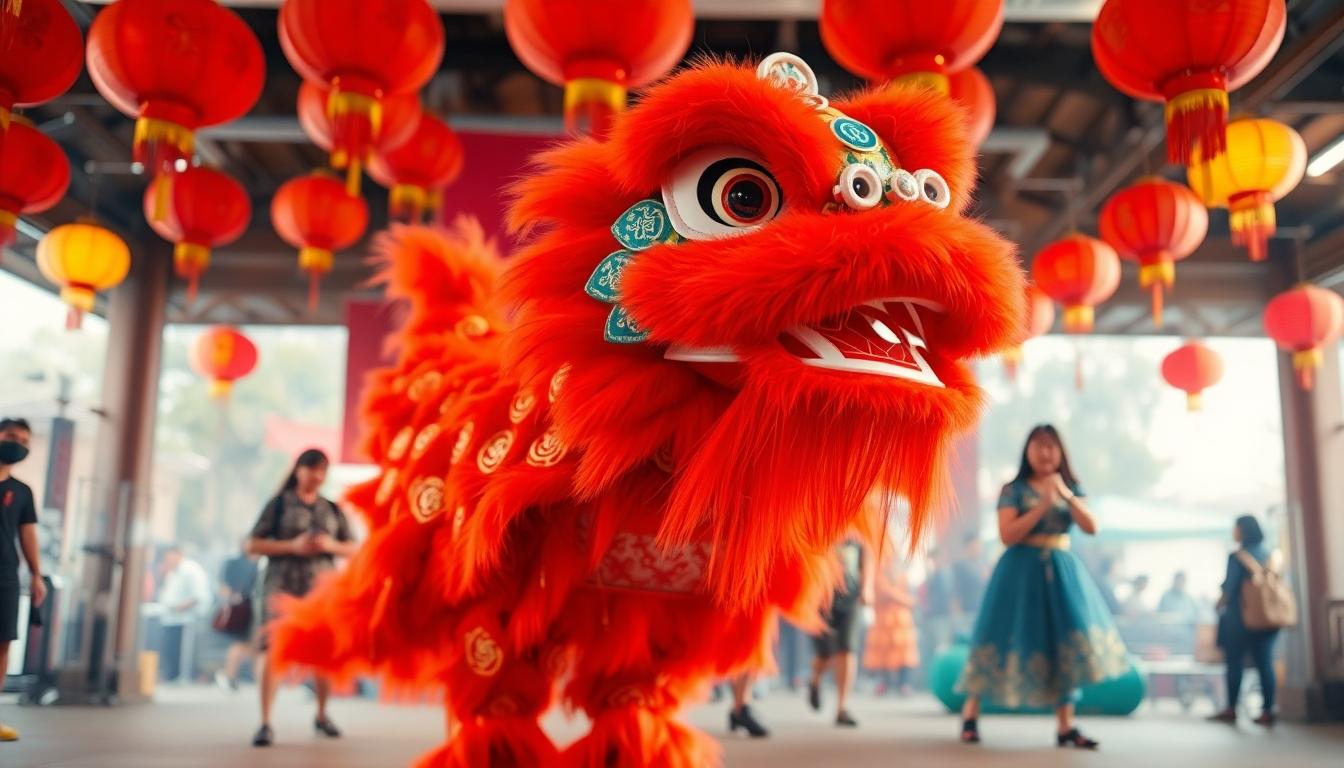
Chinese New Year celebrations wouldn’t be complete without the traditional riddles that have entertained families for generations, especially during the Lantern Festival. These clever wordplays, known as “元宵谜语” (yuánxiāo míyǔ), showcase Chinese linguistic ingenuity while bringing laughter to festivities.
Classic Lantern Riddles
Lantern riddles rely heavily on homophones and cultural symbols, creating mind-bending puzzles that challenge and delight. One popular example asks: “I’m round and sweet, a moon’s delight. In autumn, I shine, but in New Year, I’m light” – the answer is a sesame ball (Jian Dui), connecting the treat’s moon-like appearance to its festive significance.
Another favorite riddle teases: “I don’t walk, yet I go from house to house. I bring joy, warmth, and many a toast” – referring to the traditional New Year visits (bainian) when families exchange good wishes.
Food-Themed Brain Teasers
Food-based riddles dominate the Chinese New Year humor scene, reflecting the central role of cuisine in celebrations. Dumplings feature prominently in these wordplays, with riddles often emphasizing their symbolic connection to family unity.
“I’m eaten for family unity” serves as a simple yet effective riddle pointing to dumplings as the answer. These food riddles blend cultural education with entertainment, making them perfect for multi-generational gatherings.
Performance-Inspired Puzzles
Lion and dragon dances inspire many riddles that capture the vibrant spirit of New Year performances. A clever example plays on linguistic similarities: “Lion that tells jokes?” – with the answer being “A funny lion,” creating a playful pun based on the lion dance tradition.
The riddle “Cross a dragon with a lion?” leads to the answer “Roar-some animal!” – blending two iconic New Year performers into one humorous creation.
Modern Twist Riddles
Contemporary Chinese New Year riddles often incorporate modern elements while maintaining traditional formats. Zodiac animals provide rich material for these brain teasers, with riddles like “Why don’t you invite roosters to parties?” offering the amusing answer: “They wake up too early!”
Dragon-themed riddles remain perpetual favorites, such as “What do dragons eat?” with the unexpected punchline: “Firecrackers!” – cleverly connecting two distinct New Year traditions.
Red Envelope Wordplay
Red envelopes (红包) feature in many witty riddles that play on their cultural significance. The riddle “Why did the red envelope need therapy?” leads to the surprising answer: “Too many issues!” – creating a humorous double meaning between personal problems and the money “issued” inside the envelopes.
These linguistic puzzles transform traditional gift-giving into an opportunity for mental exercise and shared laughter, improving the joy of receiving hongbao during festivities.
Kid-Friendly Chinese New Year Jokes for All Ages
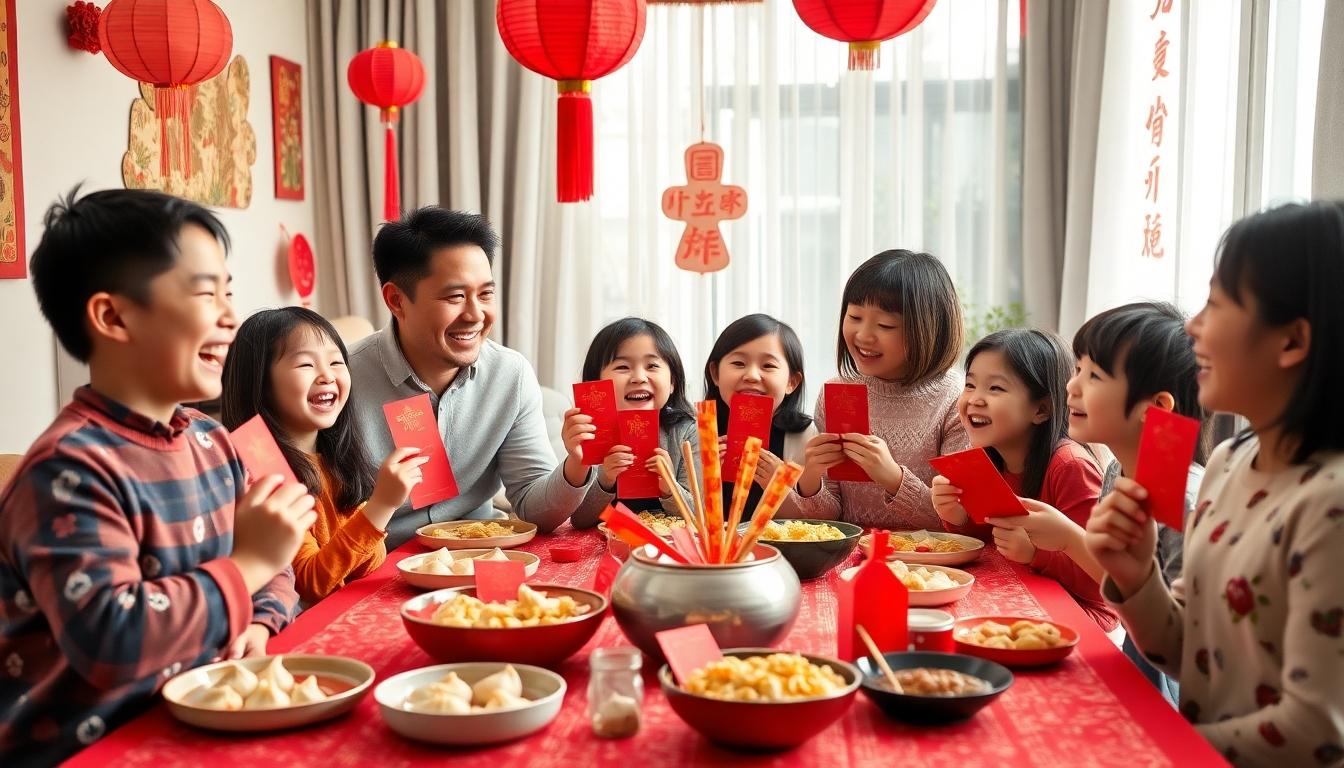
Animal-Themed Jokes
Looking for some zodiac-inspired laughs? These animal jokes will have the whole family giggling during your Chinese New Year celebrations:
- “What do cows greet elders before receiving red packets? Happy Moo Year!”
- “How do rabbits celebrate Chinese New Year? They get tu-gether!” (tu means rabbit in Chinese)
- “What’s a dragon’s favorite snack? Fire-roasted marshmallows!”
- “Why didn’t the watermelon greet the orange? It couldn’t speak mandarin!”
Food-Centric Humor
Chinese New Year celebrations always feature delicious traditional foods, making them perfect joke material for kids:
- “Why did the dumpling bring a ladder? To reach the top of the New Year!”
- “Why was the noodle always invited to New Year parties? It knew how to stir up excitement!”
Puns on Traditions
These jokes playfully incorporate beloved Chinese New Year customs and symbols:
- “Why do DJs go to the zoo on Chinese New Year? For the lion dances!”
- “What’s a cat’s favorite Chinese New Year plant? A pussy willow!”
- “What do ocean dragons say? Gong Sea Fa Cai!” (a pun on Gong Xi Fa Cai)
These kid-friendly jokes emphasize cultural elements like red packets (hongbao), zodiac animals, and festive foods, making them both entertaining and educational. They’re perfectly suited for family gatherings, classroom celebrations, or anywhere you want to share some festive cheer with the younger generation while reinforcing holiday traditions.
Bilingual Wordplay: Chinese-English Jokes That Work in Both Languages
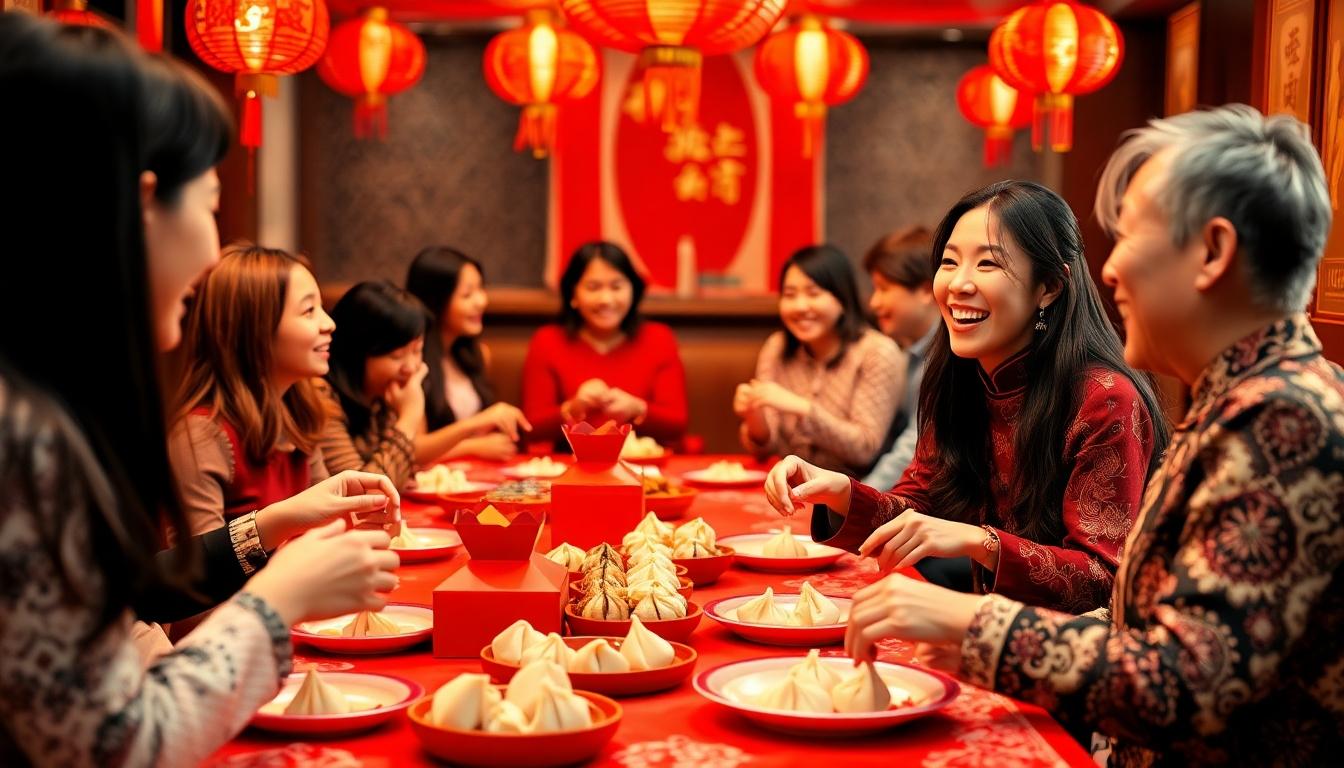
Bilingual humor creates a special bridge between cultures during Chinese New Year celebrations, offering twice the laughter through clever linguistic connections. These jokes employ phonetic wordplay that utilizes similar sounds between Mandarin and English, creating punchlines that resonate with speakers of both languages. Cultural hybrid formats blend traditional Chinese festival customs with western humor tropes, resulting in jokes that everyone can appreciate regardless of their primary language.
Phonetic Puns That Cross Languages
These jokes rely on words that sound similar across languages, creating delightful moments of recognition for bilingual speakers:
- Sticky Situation: “Why did the nián gāo (年糕) refuse to work out? It was sticky-fied to the couch!” This pun works because the traditional New Year rice cake is naturally sticky (黏), creating a perfect homophone joke.
- Sweet Predictions: “How do you say ‘fortune cookie’ in Chinese? Yùnqi bǐnggān—but only if it’s prophetic(ally) sweet!” The joke blends the translation with English word stress humor.
- Prosperity Plays: “What did one hóngbāo say to another? You’re looking red-iculously good today!” This combines the traditional red envelope with an English pun on “ridiculously.”
Cultural Symbol Humor
Symbol-driven jokes integrate traditional Chinese elements with universal comedy:
- Dragon Delights: “What do dragons eat during New Year celebrations? Fire-crackers with extra spice!” This joke references both the symbolic animal and the festive explosives.
- Dumpling Dilemmas: “If wishes came true just by eating dumplings, we’d all be billionaires with stomach aches!” This playfully reinterprets the prosperity symbolism of eating jiǎozi.
- Lantern Logic: “Why are Chinese lanterns so good at keeping secrets? Because they only light up what they want you to see!” This combines physical properties with implied wisdom.
Festive Food Wordplay
Food-centered jokes offer particularly fertile ground for bilingual humor:
- Tangerine Tactics: “How do you compliment someone’s Mandarin skills during New Year? Tell them their Chinese is quite orange-inal!” This works because tangerines (橘子) are festive gifts and “Mandarin” refers to both the language and the fruit.
- Rice Cake Riffs: “What did the nián gāo say when it got a promotion? I’m on a rice to the top!” The pun combines the rice-based cake with “rise.”
- Noodle Knowledge: “Why are longevity noodles never lonely? Because they’re really good at string-ing along relationships!” This connects the symbolic long noodles with relationship humor.
Bilingual jokes require shared cultural knowledge about customs like red envelope exchanges or dumpling symbolism to work effectively. While many cataloged Chinese New Year jokes prioritize monolingual English humor, these cross-linguistic gems create deeper connections, delighting those who understand both cultural contexts and linguistic nuances.
How to Use Humor to Teach Others About Chinese New Year Traditions
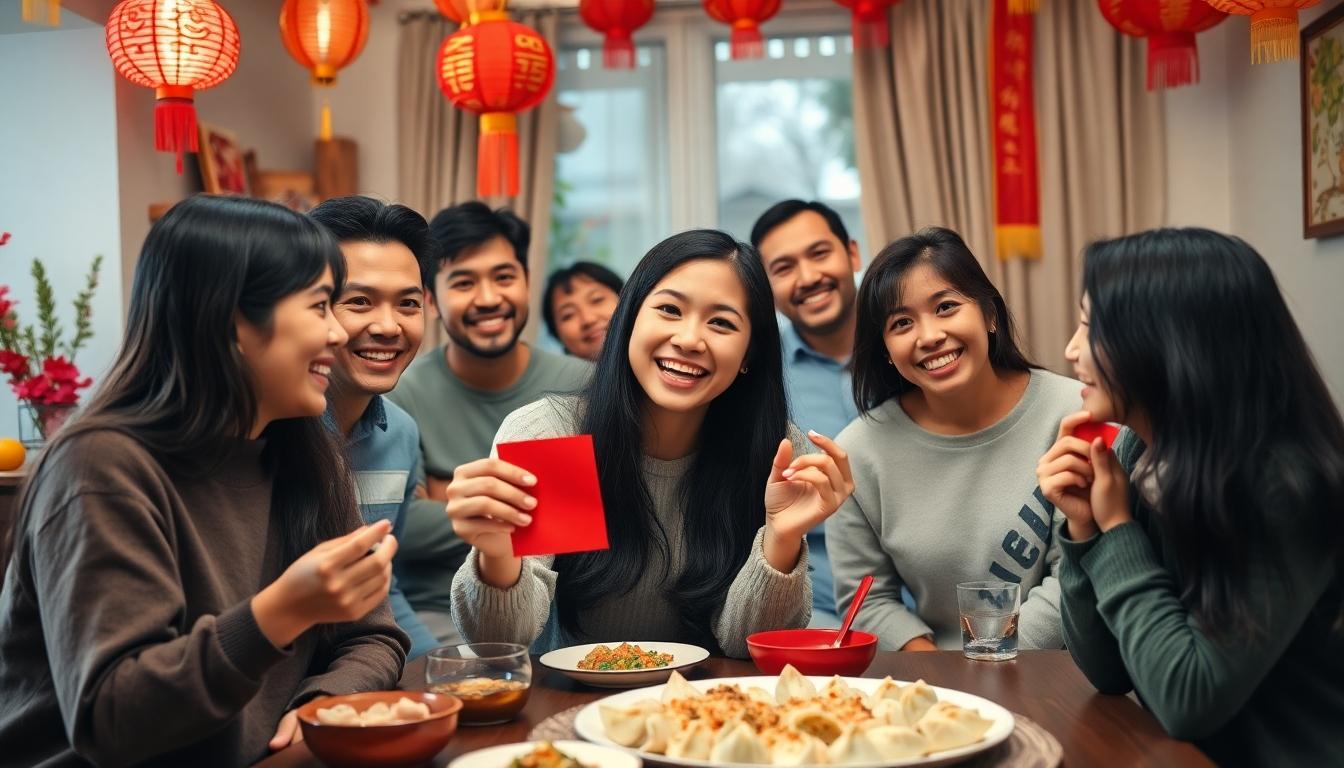
Key Traditions and Associated Jokes
Humor serves as a powerful educational tool when introducing Chinese New Year customs to others. We’ve found that jokes about red envelopes create instant connections to their cultural significance, like the playful comparison: “You may be green, but I’m the one that brings good fortune!” – as if a red envelope is talking to a dollar bill. Traditional dumpling jokes such as “Why did the dumpling go to therapy? Because it couldn’t stop feeling stuffed!” help explain their importance as symbols of wealth and family unity during celebrations. Dragon dance humor including quips about dragons getting to “fire up celebrations with dance moves” makes these magnificent performances more approachable while highlighting their communal and mythological importance.
Practical Teaching Applications
Incorporating jokes during reunion dinners creates a relaxed atmosphere for discussing cultural practices. We recommend sharing light humor such as “I’d like to wish you a Happy New Year, but I don’t want to interrupt you assembling my iPhone” to spark conversations about modern versus traditional celebrations. Lantern Festival teachings become more captivating with humorous lines like “You light up my life, but let’s keep explosions minimal!” which naturally leads to discussions about safety considerations and ancestral reverence. Fortune customs and symbolic foods can be taught through jokes such as “If wishes came true by eating dumplings, I’d be the luckiest alive!” making abstract concepts of luck and prosperity more concrete and memorable.
Cultural Nuances
Bilingual wordplay presents an excellent opportunity to teach linguistic traditions while generating laughter. We’ve seen great success with jokes that incorporate greeting phrases, like “Gong Xi Fa Cai… increases red envelope chances!” which subtly reinforce proper pronunciation while explaining cultural contexts. Satirical humor such as celebrating “by conforming to strictly enforced suggestions” can open meaningful discussions about the balance between societal expectations and individual expression during holidays. These approaches create safe spaces for exploring cultural complexities through the disarming power of laughter.
For best results, we suggest integrating these jokes into interactive activities like creating humorous red envelopes or hosting trivia games that incorporate funny facts. This combination of humor and hands-on engagement reinforces cultural literacy while keeping audiences entertained and receptive to learning about Chinese New Year traditions.
Conclusion: Ending the Year of the Old and Beginning the New With Laughter
Laughter truly is the perfect companion to Chinese New Year celebrations. We’ve shared jokes about everything from zodiac animals to red envelopes and festive foods that bring warmth and joy to this special time of year.
These humorous moments don’t just entertain—they strengthen family bonds connect generations and preserve cultural traditions in a delightful way. Whether you’re sharing bilingual puns teaching children about customs or simply enjoying a laugh over dumplings the humor enhances every aspect of the festivities.
As you celebrate this year we hope these jokes bring smiles to your gatherings and add an extra spark to your New Year traditions. After all nothing welcomes prosperity and good fortune quite like the sound of shared laughter echoing through the first days of a brand new year!
Frequently Asked Questions
What is the significance of humor during Chinese New Year?
Humor during Chinese New Year is considered auspicious and reflects Confucian values of harmony. Laughter strengthens family bonds, bridges generational gaps, and helps preserve cultural identity. Jokes incorporating symbolic elements like dragons and dumplings reinforce cultural symbols linked to prosperity while maintaining social cohesion through gentle teasing that doesn’t cross into disrespect.
What types of jokes are popular during Chinese New Year celebrations?
Popular Chinese New Year jokes include zodiac animal puns, fortune cookie humor, red envelope (hongbao) jokes, and food-related humor featuring dumplings and noodles. Traditional riddles during the Lantern Festival are also common. These jokes blend cultural elements with relatable experiences, making them perfect for family gatherings while enhancing the festive spirit.
How can parents use Chinese New Year jokes to teach children about the festival?
Parents can use kid-friendly jokes that feature red packets, zodiac animals, and festive foods as educational tools. These jokes create memorable connections to cultural practices while making learning fun. Incorporating humor into interactive activities like creating funny red envelopes or hosting trivia games reinforces cultural literacy while keeping children entertained and engaged.
Why are zodiac animal jokes particularly significant during the festivities?
Zodiac animal jokes celebrate the 12 animals of the Chinese zodiac that are central to the New Year tradition. These jokes highlight each animal’s unique traits in a humorous light, from dogs “whining and dining” to dragons bringing “good fortune with a fiery twist.” They add cultural context to the celebrations while creating lighthearted connections to the zodiac cycle.
What makes bilingual Chinese New Year jokes special?
Bilingual jokes create connections between Mandarin and English through clever phonetic wordplay, such as puns on “nián gāo” (sticky cake) or “hóngbāo” (red envelopes). These jokes appeal to those who understand both languages, fostering deeper cultural connections. They serve as linguistic bridges that make celebrations more inclusive while honoring the multilingual experience of many Chinese communities worldwide.
How do red envelope (hongbao) jokes enhance the gift-giving tradition?
Red envelope jokes add humor to the traditional giving of monetary gifts, with cash-themed puns like “It was a cash cow event!” These jokes transform the exchange of hongbao into a more memorable and entertaining experience. They create moments of shared laughter while maintaining the cultural significance of the red envelope tradition and the good fortune it represents.
What role do food-related jokes play in Chinese New Year celebrations?
Food-related jokes highlight the central role of cuisine in Chinese New Year festivities. Dumpling jokes symbolize wealth and family unity, while noodle jokes represent longevity in Chinese culture. These culinary puns add an extra layer of enjoyment to holiday feasts, creating conversation starters that connect family members across generations through shared appreciation of traditional foods.
How can Chinese New Year jokes help bridge generational gaps?
Chinese New Year jokes create common ground between older family members who understand traditional customs and younger generations who may be less familiar with them. Shared laughter over culturally relevant humor fosters connections, making traditions more accessible and meaningful to everyone. This intergenerational bonding helps preserve cultural identity while creating new family memories.
Are fortune cookie jokes actually traditional in Chinese culture?
Fortune cookie jokes highlight an interesting cultural fusion, as fortune cookies themselves originated in America, not China. The article acknowledges this while embracing how these cookies have become part of the Chinese restaurant experience globally. The humor comes from their often absurdly blunt or ironic messages, creating memorable moments that enhance festive dining experiences regardless of their non-traditional origins.
How can teachers use Chinese New Year jokes in classroom settings?
Teachers can incorporate Chinese New Year jokes as engaging educational tools that make learning about the festival fun and memorable. Kid-friendly jokes can introduce cultural concepts, while bilingual jokes help language learners. Jokes can be integrated into activities like creating riddles, designing humorous greeting cards, or hosting mock New Year celebrations, reinforcing cultural understanding through laughter and participation.

